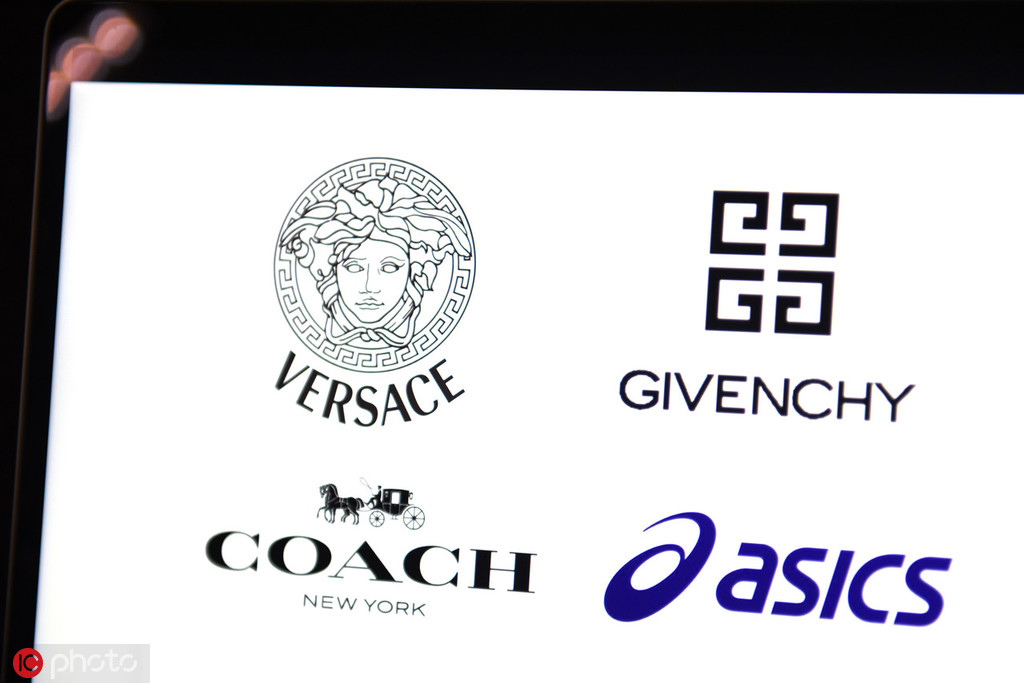Various brands lament labeling territories as separate countries
By Zhang Zhihao | China Daily | Updated: 2019-08-13 07:28

Apologies from Coach, Givenchy, Asics follow Versace's regret over similar issue
Fashion brands Coach and Givenchy apologized on social media on Monday after Chinese netizens criticized them for selling clothes that mislabeled Hong Kong and Taiwan as separate countries, a day after Italian fashion house Versace apologized and lost its Chinese brand ambassador over a similar offense.
All three brands featured a similar design-a list of cities and countries-that listed Beijing and Shanghai as part of China. But Versace listed Hong Kong and Macao as separate nations on its design. Coach and Givenchy did the same thing with Hong Kong and Taiwan.
Images of these three brands' misprinted T-shirts recently went viral on Sina Weibo micro blogs in China.
Japanese sportswear manufacture Asics also apologized on Sina Weibo on Monday for inconsistent labeling as it listed Hong Kong and Taiwan as separate countries on its foreign-language websites, but placed the two regions under China on its Chinese website.
Chinese model Liu Wen said on her official Sina Weibo account that she had terminated her contract with Coach and strongly condemned its action for hurting the feelings of the Chinese people. Liu became Coach's brand ambassador on July 26.
"I want to apologize for the harm caused to everybody due to my indiscreet selection of brand to represent," she said. "I love my country, and will adamantly safeguard China's sovereignty. National sovereignty and territorial integrity are sacred and cannot be violated under any circumstances."
On Monday noon, the studio of Chinese singer-actor Jackson Yee, also known as Yi Yangqianxi, said in an online statement on Sina Weibo that he had terminated his cooperation with Givenchy Beauty, the fashion brand's perfumes and makeup line.
"We are extremely angry at Givenchy for designing clothing that is suspected of damaging China's national sovereignty and territorial integrity," the statement reads. "We have stopped all cooperation with Givenchy. Mr Yee and his studio resolutely uphold the one-China principle and adamantly safeguard national sovereignty and territorial integrity."
By Monday afternoon, Coach and Givenchy issued their apologies on Sina Weibo, saying they are sorry for the inaccuracies. The two brands also reiterated their respect for Chinese sovereignty and territorial integrity, as well as their commitment to provide products and services to Chinese customers.
Coach posted an apology on its Twitter account, and Givenchy did the same on its Facebook page. Both said they have immediately pulled those products from all channels globally and will take measures to avoid similar mistakes in the future.
Experts said these controversies are particularly hurtful to Chinese people, especially while Hong Kong is embroiled in increasingly violent protests and while cross-Straits relations are facing growing uncertainties.
An editorial by People's Daily on Monday questioned the sincerity of the apologies by foreign companies. "If they really learned their lesson, they shouldn't 'queue up' to cause trouble in questions related to Hong Kong, Macao and Taiwan."
The editorial warned foreign companies not to undermine China's sovereignty, and China will take some "defensive tools" to deal with companies that violate its bottom line.
Zhu Songling, a professor at the Institute of Taiwan Studies at Beijing Union University, said while most countries recognize and respect the one-China principle, some countries have been trying to stir up trouble through official and unofficial means in Hong Kong and Taiwan for years.
"This puts foreign companies who wish to make money in China in a peculiar spot," Zhu said. "Intentional or not, they must play along with the political rhetoric of their home countries or face scrutiny back home. This includes upholding naming conventions that may agitate Chinese customers."
Last January, the Marriott hotel chain listed the Tibet autonomous region, Taiwan, Hong Kong and Macao as separate countries in their survey, resulting in its Chinese website and app being shut down for a week. Delta Air Lines and clothing stores Gap had also run into similar controversies by misrepresenting Chinese territories last year.
"Foreign companies know that if they want to make money in China, they must follow Chinese laws and maintain good relations with Chinese customers," Zhu said.
"They are often apologetic and willing to correct their mistakes if caught red-handed. Otherwise, there are not many other incentives for them to change their practices."
























